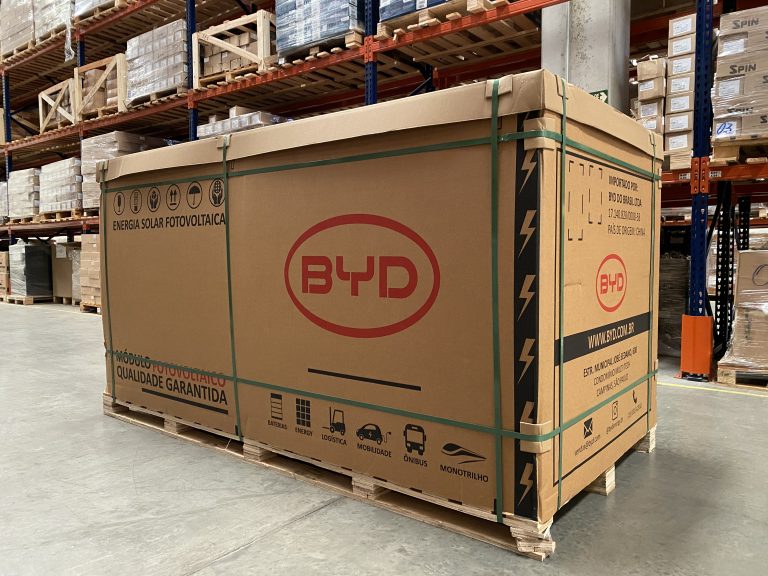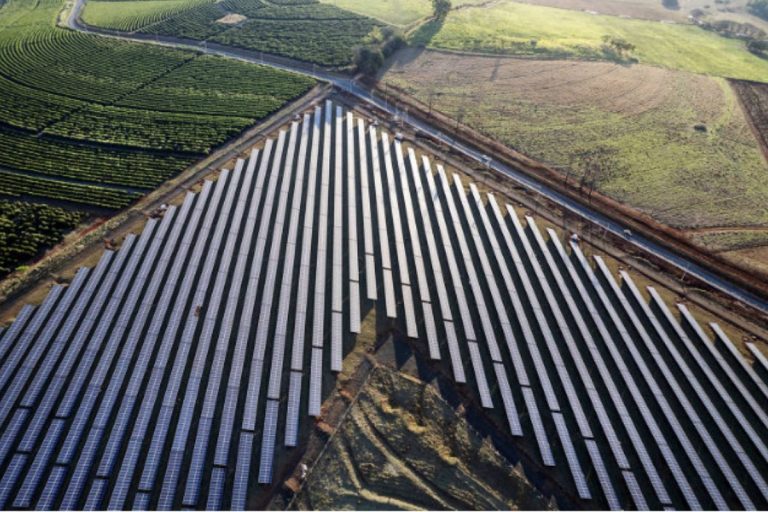Diesel generators have been a traditional solution for guaranteeing electricity in places where access to the grid is limited or intermittent.
But with technological advances and growing concern for the environment, there are more modern, sustainable and efficient options that work as generator replacement.
In this article, we'll explore alternatives to the diesel generator, with a focus on BYD's LFP stationary batteries, such as the MC Cube and the BYD Battery Box (BBOX). Read on to find out how these solutions can transform your energy supply!
Diesel generators and their characteristics
Diesel generators are machines that convert mechanical energy into electrical energy by burning diesel in an engine.
Although they are used in emergencies and areas without mains power, their operation has serious disadvantages.
Operation and common applications

The operation of these generators depends on the combustion of diesel, which drives an alternator to generate electricity.
They are common in remote locations such as construction sites, farms and mines, as well as serving as backup in hospitals, industries and data centers. However, their apparent robustness and reliability hide significant problems.
Efficiency and limitations
This equipment faces challenges in terms of efficiency and environmental impact. The main limitations include:
- High emission of polluting gasesContribute to air pollution and greenhouse gas emissions.
- High noise: Operation is extremely noisy, causing discomfort and noise pollution.
- Fuel dependencyThey require a constant supply of diesel, with costs and logistics involved.
- Frequent maintenanceThey require regular and constant maintenance, generating additional costs and interruptions.
These factors make diesel generators an unsuitable solution for those looking for efficiency and long-term sustainability.
Greenhouse gas and pollutant emissions, constant noise, fuel dependency and frequent maintenance make this technology a problematic and unviable option.
Disadvantages of diesel generators
Diesel generators have significant drawbacks that need to be considered before purchasing them. They are notoriously noisy, especially the higher-powered models.
What's more, burning diesel, while efficient in terms of consumption, results in high emissions of pollutants, damaging the environment.
The maintenance of these generators is also complex, requiring constant attention to avoid failures.
Environmental impact
Diesel generators contribute substantially to the increase in greenhouse gas emissions, such as carbon dioxide (CO2).
Burning diesel also releases pollutants that are harmful to air quality, including nitrogen oxides (NOx) and particulate matter.
In a global context where sustainability is crucial, the negative environmental impact of diesel generators is a determining factor in the search for greener alternatives.
Maintenance and operating costs
The costs associated with diesel generators go beyond fuel. Regular maintenance, such as oil changes, filter replacements and repairs, are essential to ensure proper operation.
In addition, mechanical wear can lead to the need to replace equipment prematurely, further increasing total costs.
Unnecessary expenditure on diesel generators
Diesel generators can be costly in the long run. From ongoing fuel consumption to maintenance and repair costs, these solutions can become financially unviable when compared to modern alternatives that also involve solar energy as part of the solution.
Understanding these costs and exploring more economical options is fundamental for those seeking energy efficiency and long-term savings.
Long-term cost analysis
Diesel generators, although misleadingly presented as an economical solution initially, quickly turn out to be a financial and environmental nightmare over time.
Continuous diesel consumption represents a significant operating cost, especially in a market subject to volatile fuel prices. In addition, regular maintenance, which includes changing oil, filters and other components, added to the natural wear and tear of the engine, entails recurring and cumulative expenses.
Not to mention indirect costs, such as the logistics of supplying diesel in remote locations, which can also represent a considerable expense. When all these factors are analyzed together, it becomes clear that diesel generators are not the most cost-effective solution for the long term.
Comparison with more sustainable alternatives
BYD's solar-powered stationary batteries offer remarkable advantages in terms of cost-effectiveness.
Unlike diesel generators, they eliminate fuel costs, require minimal maintenance and have a significantly longer service life.
Replacing the diesel generator with a photovoltaic solar plantcombined with a BYD battery system (which can be BBOX, C&I or Large ScaleThis represents a more economical and sustainable solution in the long term.
Advantages of OFF GRID solar energy systems with batteries
The growing search for sustainable and economically advantageous energy alternatives has driven the adoption of off-grid solar energy systems.
At the heart of these innovative solutions are energy storage batteries, such as the BYD MC Cube model, which offer significant benefits.
Energy independence
These systems provide energy independenceThis allows companies and communities to disconnect from the traditional electricity grid and manage their own energy production and consumption.
With BYD MC Cube ESSIn addition, it is possible to store energy generated by renewable sources such as solar photovoltaics, guaranteeing a stable and reliable supply even in remote locations or during grid interruptions.
In large-scale off-gridIn mining, large farms or isolated communities, the MC Cube ESS stands out for its ability to store large amounts of energy.
This makes it possible to power critical operations 24 hours a day, 7 days a week, without the need to rely on polluting and costly diesel generators.
The stored energy can be used during the night or on cloudy days, ensuring a continuous and predictable supply.
Sustainability and innovation
In addition to energy independence, the use of BYD MC Cube batteries promotes sustainability and innovation. The batteries use LFP (Lithium-Ferro-Phosphate) technology, known for its safety, long service life and lower environmental impact.
By integrating the MC Cube ESS into an off-grid system, dependence on fossil fuels is drastically reduced, lowering the carbon footprint and contributing to a cleaner future.
To replace a diesel generator, you can consider more sustainable and efficient alternatives, such as natural gas generators, solar systems with batteries, small wind turbines or even hybrid systems. In addition, if necessary relocate of the generator, it is important to assess issues such as proper transportation, safety regulations, the physical space available in the new location and the need for adaptations to the electrical installation to ensure the correct and safe operation of the replacement equipment.
BYD LFP batteries and storage systems
BYD's stationary batteries are cutting-edge solutions that efficiently replace diesel generators. The main models include:
- BYD Battery Box (BBOX): A modular and flexible solution for demands under 1 MW, perfect for commercial and residential applications and telecommunications systems. BBOX adapts easily to different spaces and power needs, with high flexibility for installation and expansion.

- MC-I BYD: The ideal solution for medium-sized projects such as commercial buildings, schools and small industries. MC-I BYD offers ease of installation and maintenance, optimizing system implementation time.
- MC Cube ESS: Ideal for energy demands above 1 MW. This modular system offers a robust and scalable solution for large industrial applications, hospitals, data centers and mining projects. Its large-scale storage capacity guarantees a continuous supply of energy for critical operations.

- MC Cube-T: For large-scale projects with high energy demand, such as solar parks, microgrids and large industrial complexes, the MC Cube-T offers a complete, pre-configured solution. Its robust, modular structure allows for easy transportation and installation, as well as high storage capacity.
Benefits and applications
BYD batteries offer a number of advantages that make them ideal for replacing diesel generators in a variety of applications. In addition to energy storage and distribution, allowing the use of solar power, stand out for their significant reduction in carbon footprint, contributing to a cleaner future and in line with global targets to combat climate change.
The applications for BYD batteries are vast, ranging from small residential installations to large industrial operations.
The MC Cube ESS model, for example, is ideal for demands above 1MW, while the BYD Battery Box (BBOX) efficiently meets smaller capacities. The MC-I BYD and MC Cube-T models expand the possibilities even further, catering for medium and large projects respectively.
Replacing diesel generators with BYD stationary batteries is a smart and strategic choice for those seeking energy independence, sustainability and reduced operating costs.
With a wide range of models and applications, BYD batteries adapt to any need, from small homes to large industries.
Don't waste any more time and money on outdated solutions! Discover how BYD batteries can transform your energy infrastructure and ensure a more sustainable future. Contact us.










